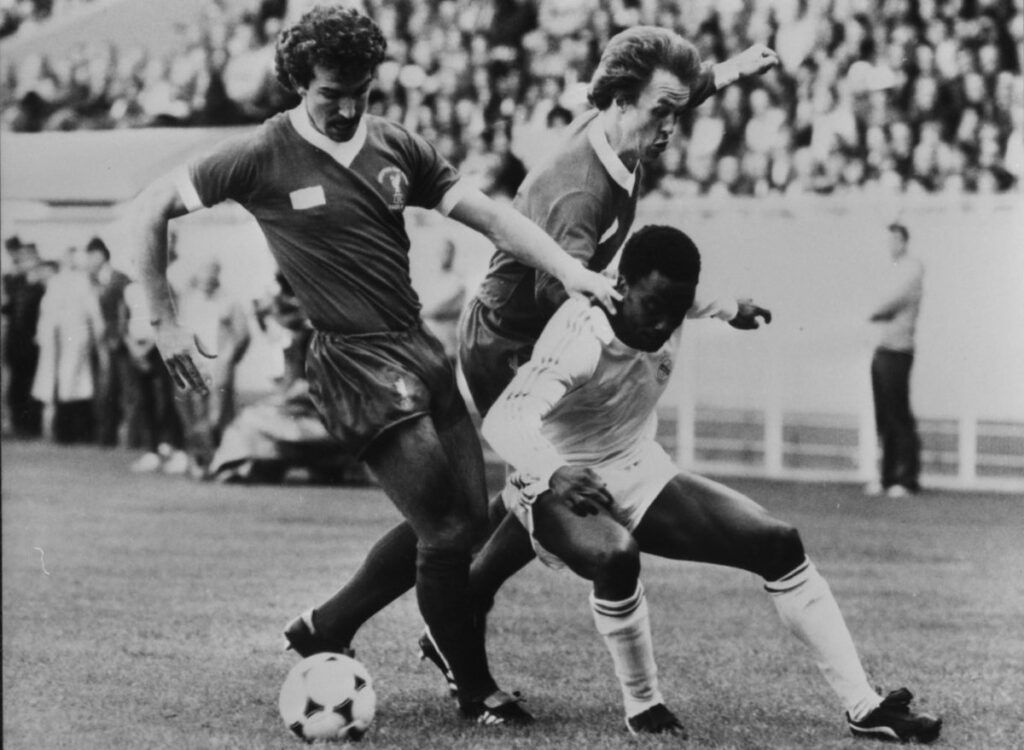In the middle of a small park in East, a few steps from Leyton Orient Stadium is a statue of a man with his arms outstretched, his left leg raised. His football boots make his career clear, but his position may be that of a dancer, perhaps even a trapeze stylist.
Balletic is a term often coined by Laurie Cunningham, an electrician who regularly flew over the mud of the ’70s, moving her defenders slowly and steadily. Cunningham was the first Englishman to join Real Madrid, as well as one of the first black players to represent England. He has been mistreated several times.
Those who remember seeing him play played all the horror words. Former Spain coach Vincente del Bosque, who described Cunningham’s teammates in Madrid as “Cristiano Ronaldo of his time”.
But maybe he did more.
Cunningham is another worldwide gift of evil and evil gods that explores his beauty. He is a pioneer for black runners who often see themselves as role models. He was a special passenger whose life was short of an accident.
Born in Jamaica and raised in North London, Cunningham is often described as a quiet and calm player, in contrast to his brilliant football style.
When he joined the Highgate North Hill youth team in 1968, he immediately gave him a wonderful gift, but also a playful boy who could take on any challenge on the farm.
Arsenal showed interest and tried Cunningham, followed by a student-run in 1970. But the Gunners played a kind of “give and take” that left little room for Cunningham to pass. He hit them twice. It came out in 1972 with the title: “It’s not fair”.
Cunningham’s expectations are based on balance. He called it Leyton Orient – later on, Second Level, also known as Orient. His first appearance, at the age of 18, took place on August 3, 1974, on a friendly program before playing for West Ham.
“The one who lost 1-0”, Orient fans recall, “ran and ran, dribbling through Upton Park. It was already something new.”
Cunningham also leaves the field; he loved to dance, fashion, painting, architecture, and wine. Most of the time is spent outside the stadium on the dance floor, walking well to places like Crackers and Tottenham Royal a couple of times a week.
He is a man of power in his own right, which can be tiring – the East often pays him for his late arrival – and charges him a turbo. It is said that he will use the prize money from the dance contest to pay the penalty.
His three years with the East resulted in 75 appearances, 15 goals in transfers at West Bromwich Albion. His talent shines like never before under difficult circumstances.
If racism and football were still prevalent today, they could not be compared to what was seen in English stadiums in the 1970s. Bananas, coins, and even balls were thrown at people with black skin. They are bullied and beaten. In most cases, he was not punished.
Cunningham and WBA player Brendon Batson explained how he would feel if the National Front left the game, where he would come into danger and spit on it.

Cunningham is often the best player in the game, a fact that will further offend offenders. He played his game him, usually breaking half of his opponent’s team before hitting the net.
Viv Anderson, who in 1978 became the first black player to win an English championship. “Athletes, like Laurie, get most of the wood.”
On 27 April 1977, Cunningham himself donned a white England shirt, with an under-21 team against Scotland at Bramall Lane, winning a 1-0 game to the end. He will play six games for the England national team.
But the crucial moment came in 1978-79, with Batson and Cyrille Regis in the baggy comic Baggies walking alone in the controversial final week of the season to finish third.
This isn’t the first time three black players have played together in an English football game, but Batson, Cunningham, and Regis are the first to do so regularly. They call it the “Three Steps” – a quote from manager Ron Atkinson referring to one of America’s most famous souls.
Cunningham’s older brother, Keith, was waiting for him in Spain when the couple received word that his partner Keith and his two children had been killed in their early relationship in their home, a crime that has remained unsolved for 28 years.
Also Read: Lionel Messi: Stories from Paris St-Germain’s first few months in France
Real Madrid continued to support, giving Cunningham sympathies the right to return to England and miss the start of the season, but the text on the wall. When Dutchman Johnny Method arrived, at a time when the Spanish team could only field two players, he was sent off more often than in the game. The painful trauma has left his old partner, with those closest to him describing an unpleasant time.
Batson said: “Sometimes I think West Brom needs another year or two, but Real Madrid won’t leave.” “He was only 23 when he left and I’m not sure the people around him are the same way.”
The loan to Manchester United in connection with his former West manager Brom Atkinson went to waste, and when he stepped down at the end of the 1983 FA Cup, it was clear Cunningham’s trust and confidence was in him.
The next five seasons were a list of temporary loans and contracts leading to Sporting Gijon, Marseille, Leicester City, Rayo Vallecano, and Wimbledon. There were a few moments along the way, most notably Dons’ unbeaten run in the FA Cup against Liverpool in 1988, where he joined as a substitute and Rayo’s impressive promotion to the last day in La Liga in 1989. But it was a quick dribble. not the same.
Even outside the camp, life was very chaotic. The relationship produced two children, only one of whom is still a part of his life. The unsustainable investment process and long-standing problems with the mountain club on the outskirts of Madrid happened based on a football career that was going faster than anyone expected.

Cunningham’s story ended tragically on July 15, 1989.
Early in the morning, after spending the night at a party at the O Madrid pizzeria, he drove La Coruna from his hometown with an American, Mark Latty, beside him.
Approaching, Cunningham rushed past the slow car, but could not find another car beside the tires. Cunningham, who did not have a seat belt, could no longer control it. A lamppost hit his car and he turned around again. Cunningham was taken to hospital but was pronounced dead shortly after. He is 33 years old. Latty survived the accident.
Reports of Cunningham’s toxic triple crossing the border will lead to alcoholism. Regis later revealed that they had been involved in a similar incident several years ago.
Regis said, “If we don’t have seat belts, we will die.”
This statue will not be used to honor the many athletes in their stadium. Laurie Cunningham had two: the first outside the Leyton Orient home, the second outside the Hawthorns, and Regis, who died aged 59 in 2018 in Batson, now at 68.
He is remembered as a footballer who played football with his feet, slowly changing what a black footballer could be.
Anderson, a former England player, said: “Right now I’m looking at the wings and I’m still comparing him to Laurie Cunningham. He can do what other players can dream of.
“His football is coming ahead of schedule. Look at the holes he is playing and the pressure he is getting… if I put him on an equal footing with everyone else, he will be close to the top.” Added Batson: “What happened to Laurie is sad, but it’s something to be proud of saw him play. I think we all have a chance to see the best in him.”


